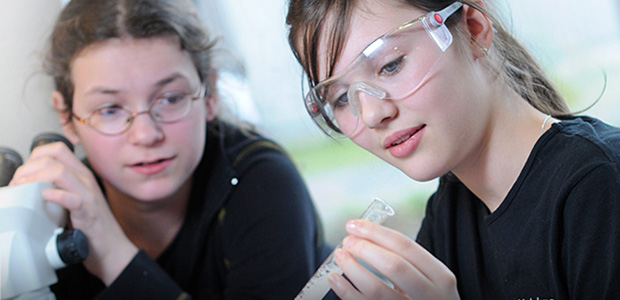
English
Jugend forscht in a Nutshell
Objectives – Jugend forscht encourages and supports talented achievers in the areas of science, technology, engineering and mathematics (STEM). It seeks to inspire young people to become involved for the long term, and, after the contest, to help them with their careers.
Founding Father – In 1965 Henri Nannen, the then editor of the magazine stern, coined the motto "We are looking for the scientists of tomorrow" as he invited young people to take part in the very first jugend forscht contest.
Stiftung Jugend forscht e. V. – Jugend forscht is a joint initiative supported by the Federal government, stern magazine, the business and scientific communities, and schools. Its patron is the Federal President. The chair of the Board of Trustees of Stiftung Jugend forscht e. V., which is a nonprofit organization, is the Federal Minister for Education and Research. The head office is located in Hamburg. This is where the network and nation-wide activities are coordinated.
Network – Jugend forscht is the largest public-private partnership of its kind in Germany. There are about 250 partners, most of them from the business community. They organize the contests, donate the prizes and lend their support to other activities. The Federal Ministry for Education and Research (BMBF) defrays the running expenses of the Jugend forscht head office.
Volunteers – More than 5,000 teachers support Jugend forscht as project advisors and contest managers. Over 3,000 specialists, academics and experts from the business community evaluate the work. Their volunteering activities are a crucial pillar of Jugend forscht.
Contest levels – The contest is organized on a decentralized basis and replicates the federal structure of the Federal Republic. It takes place on three levels. In February the participants compete in a regional contest. In March the winners can compete at the state level, and those who come out on top on this occasion qualify for the Federal Contest held in May. All in all there are more than 120 contests annually.
Participants – The contest is for young people up to the age of 21. Schoolchildren who wish to participate must be at least in fourth grade in the year of registration. Students can participate only in the year in which their higher education courses begin. Since it was founded, more than 300,000 young people have taken part in Jugend forscht.
Age Groups – The contest caters for two age groups. The junior segment, “Schüler experimentieren”, is for young people up the age of 14. From the age of 15 onwards they take part in “Jugend forscht”. The age of participants on 31 December in the year of registration determines the segment to which they are allocated.
Subjects and Areas of Expertise – The participants are free to choose their research subjects. Once they have identified an interesting issue, they examine it using scientific, technical or mathematical methods. However, their project must be allocated to one of seven areas of expertise: work environment, biology, chemistry, geo- and space sciences, mathematics/IT, physics, and technology.
Registration – Participants must register online by 30 November. The contest accepts individuals or teams of two or three.
Written work – A precondition for participation is a written report on the research project of no more than 15 pages in length which has to be submitted by January.
Presentation and Jury Interviews – At the contest the young scientists present their projects at an exhibition stand which they must organize themselves. Here they are interviewed by a special jury.
Prizes – There are cash and other prizes totalling more than a million euros. They include research visits and internships and participation in international youth contest.

Cookie-Einstellungen
Wir nutzen Cookies, um Ihnen die bestmögliche Nutzung unserer Webseite zu ermöglichen und unsere Kommunikation mit Ihnen zu verbessern. Wir berücksichtigen Ihre Auswahl und verwenden nur die Daten, für die Sie uns Ihr Einverständnis geben.
Notwendige Cookies
Diese Cookies helfen dabei, unsere Webseite nutzbar zu machen, indem sie Grundfunktionen wie Seitennavigation und Zugriffe auf sichere Bereiche ermöglichen. Unsere Webseite kann ohne diese Cookies nicht richtig funktionieren.
Statistik-Cookies
Diese Cookies helfen uns zu verstehen, wie Besucher mit unserer Webseite interagieren, indem Informationen anonym gesammelt werden. Mit diesen Informationen können wir unser Angebot laufend verbessern.